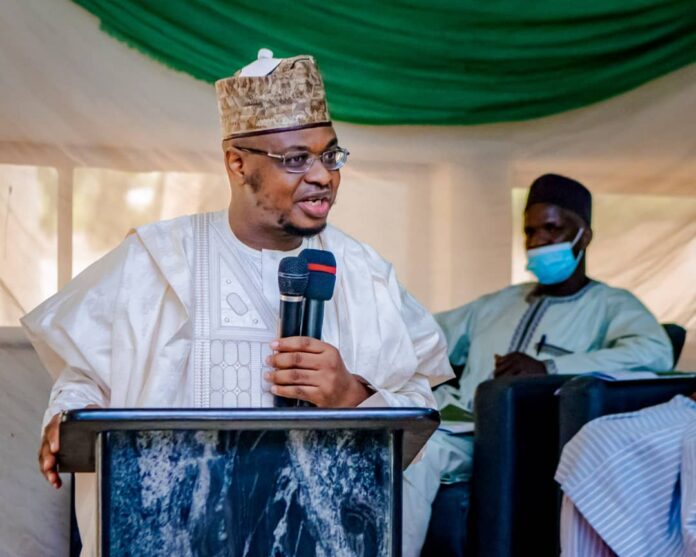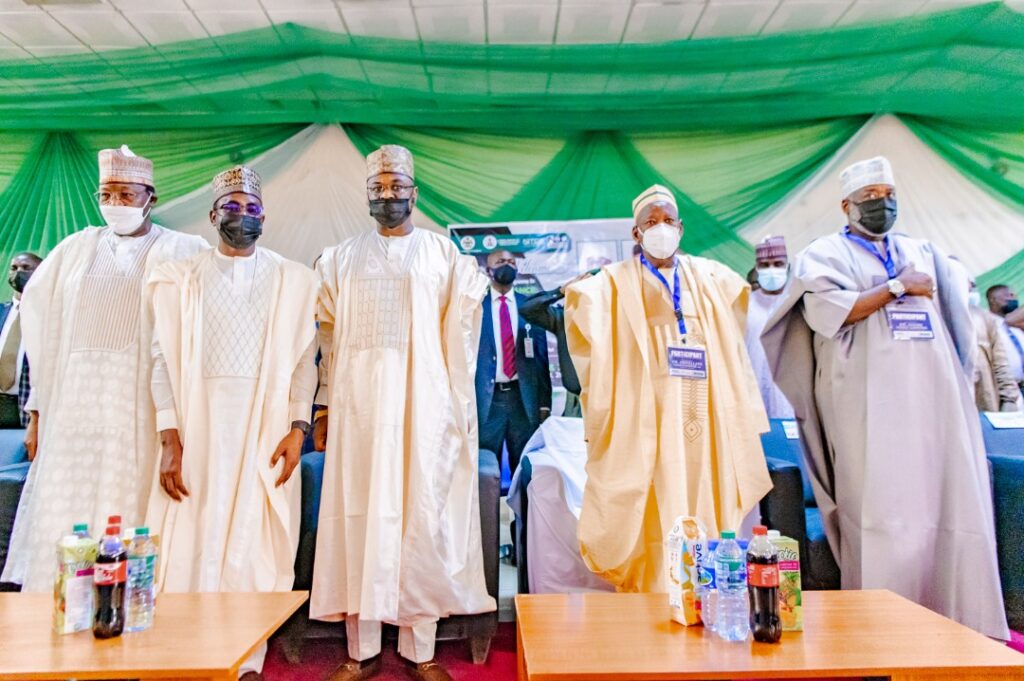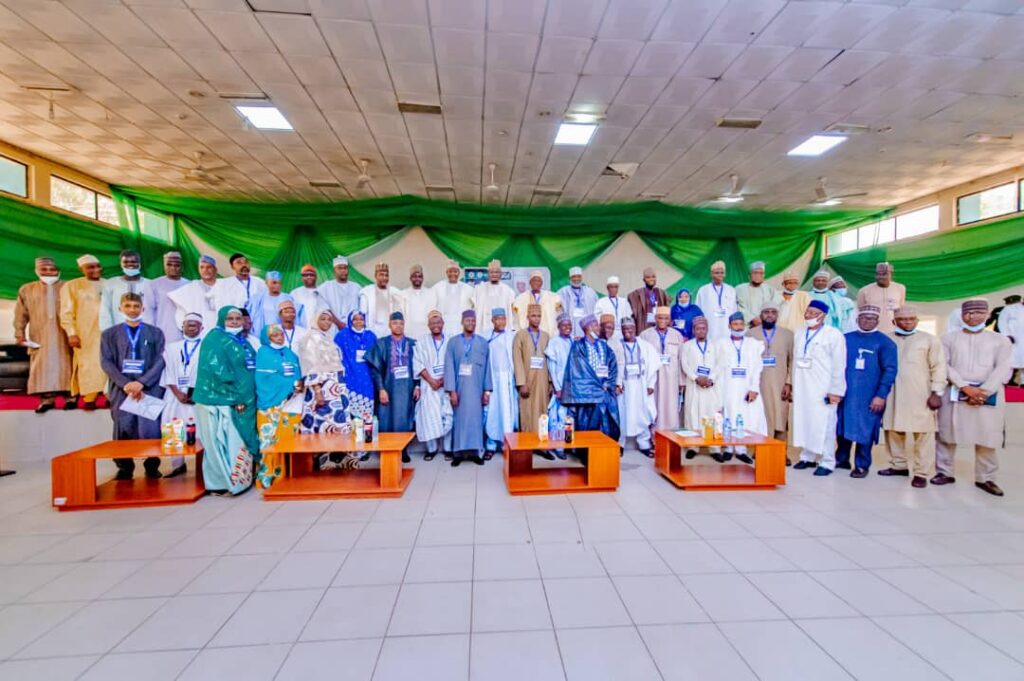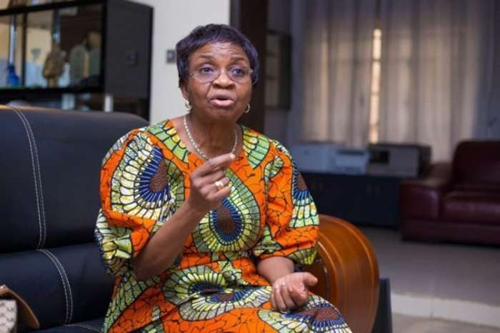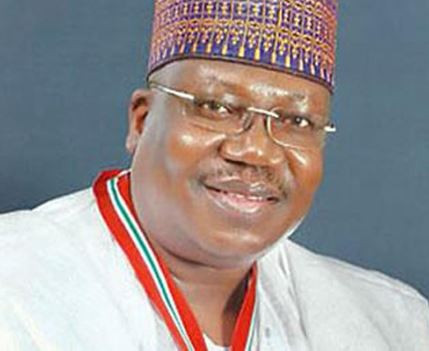In its fulfillment to enable the development of National Digital Economy Policy and Strategy (NDEPS), the Federal Government of Nigeria, through the Ministry of Communications and Digital Economy, under the leadership of Honourable Minister, Dr Isa Ali Ibrahim Pantami, has kick-started a pioneer programme to train Members of Kano Executive Council on e-Governance and Digital Transformation.
The programme was initiated to give special training to the top government officials in the state on modern technology adoption, in order to improve their performances at all levels while delivering services to the general public.
The opening ceremony of the 2-day event, which commenced today, 2nd August, 2021, was attended by Kano State Governor, Dr Abdullahi Umar Ganduje, his Deputy, Dr Nasiru Yusuf Gawuna, Secretary to the State Government, Alhaji Usman Alhaji, Commissioners, and other members of the Executive Council of the state.
While making his address, Dr Ganduje thanked the Federal Government, particularly the ministry for bringing various initiatives, including training of over 1000 youths on digital skills and other supports provided in the state.
The governor commended Dr Pantami for matching words with action, adding that the e-governance training was as a result of his visit to the Communications and Digital Economy Complex in Abuja where he initiated talks on the possible collaboration and partnership with the Ministry to foster ICT development in Kano state.
He also hinted his government’s commitment towards the realization of ICT policy in the state. According to him, ICT has been a critical element to governance, and his administration is making all efforts to ensure that the state taps on the immense benefit of e-Governace and digital technologies by simplifying government operations as well as limiting government spending.
He said, “It is imperative we apply the new system being used anywhere in the world, because the old system of government would not move the state forward.”
The governor assured that he would continue to come up with ways to streamline government operations and reduce the cost of running his administration.
On his part, Dr Pantami, while delivering his keynote address, noted that the training is the first of its kind in Nigeria at the state level, and there cannot be a better place to start than Kano State, according to him, Kano State is the most populous state in Nigeria and the commercial nerve centre of Northern Nigeria.
He said, historically, the people of Kano have always been known to be hardworking and industrious. “They were among the first people to establish major industries and conglomerates in Nigeria, trading in food and drinks, textile and footwear, tanning, ceramics, and furniture,” he added.
Dr Pantami stated that the commencement of the programme makes Kano State Executive Council Members the first beneficiaries, which at the end, Kano will be well positioned to develop a strong digital economy, and have a transformational impact on the state and the nation at large.
He said that in light of global trends in the delivery of government services which is increasingly being characterized by the digitization of processes, the Federal Ministry of Communications and Digital Economy developed the Nigerian e-Government Master Plan (Ne-GMP) with the vision “to create a world class, open and digitized government that connects with people to drive efficiency in public administration, responsiveness of civil services and transparency in governance leading to improvement of the quality of life of Nigerians”.
“This is in line with the Ministry’s mandate to Utilize ICT to drive transparency in governance and improve the quality and cost effectiveness of public service delivery in Nigeria. The Plan was developed with specific strategies that will improve the quality of citizen’s lives by enhancing national competitiveness, facilitating market economy, promoting participatory democracy, and improving transparency in the public sector.
“These strategies include the expansion of the number of public sector personnel trained on e-Government and the publicizing of e-Government initiatives at the Federal and State Level. Various Capacity Building Programs have therefore been developed to aid the attainment of this goal,” he said.
Dr Pantami stated that the National Digital Economy Policy and Strategy (NDEPS) was developed and launched in 2019 to reposition the Nigerian Economy in order to take advantage of the many opportunities that digital technologies provide. “This is in line with the vision of President Muhammadu Buhari to diversify the economy of Nigeria away from the dependence on the oil and gas sector, he said.
“As you may know, the NDEPS is anchored on eight (pillars, one of which is the Digital Literacy and Skills Pillar which provides policy backing for massive training of Nigerians from all works of life in order to enable them obtain digital literacy and other digital skills. An objective of the NDEPS is to support training and Capacity Building among public sector employees in the development and use of digital tools and applications to improve the delivery of government services.
“Furthermore, the Service Infrastructure Pillar provides support for Government Digital Services and the provision of robust digital platforms to drive the Digital Economy. This pillar supports the provision of a online platforms for government to interact with citizens and investors. It supports the deployment of government digital services and a paperless system. A key objective of the Service Infrastructure Pillar is the implementation of the e-Government Master Plan,” he added.
Dr Pantami also seized the opportunity to express his sincere appreciation to His Excellency, President Muhammadu Buhari, GCFR, for providing the vision and leadership as well as his unwavering support, saying that “we could not have been able to achieve what the Ministry and its Parastatals achieved without Mr President’s continued support and we are most appreciative.”
Earlier in his opening remark, the Director General, National Information Technology Development Agency (NITDA), Mallam Kashifu Inuwa Abdullahi, CCIE, said that the training programme is a milestone to the Kano State digital economy journey.
He emphasized that a lot can be achieved together, especially in e-governance and digital transformation which has five milestone; firstly, is about moving government services online for users to conveniently access government services as well as cost reduction, while the second one is to have open data for the state to engage its citizens, getting more information and data economy; and the third is using digital technology to inform decision easily by the data you have.
The DG added that, digital governance, which is fourth on the list, is beyond enhancing existing processes, he said it is about using technology as a source of inspiration to come up with new way of delivering services, using technology to come up with innovation in the way you do your business and unlock opportunities for the citizens.
He said the fifth one is to make the government smart by using emerging technology to predict what is going to happen, what the citizens are going to think and how to shape and equip the citizens’ mindset within the state.
“The programme is about how to design digital economy, position Kano State Government to key in to the Federal Government digital economy initiative, and this can be done through aligning three things: people, processes, and the technology. And this training is going to expose you, build your capacity to make governance easier,” he added.



